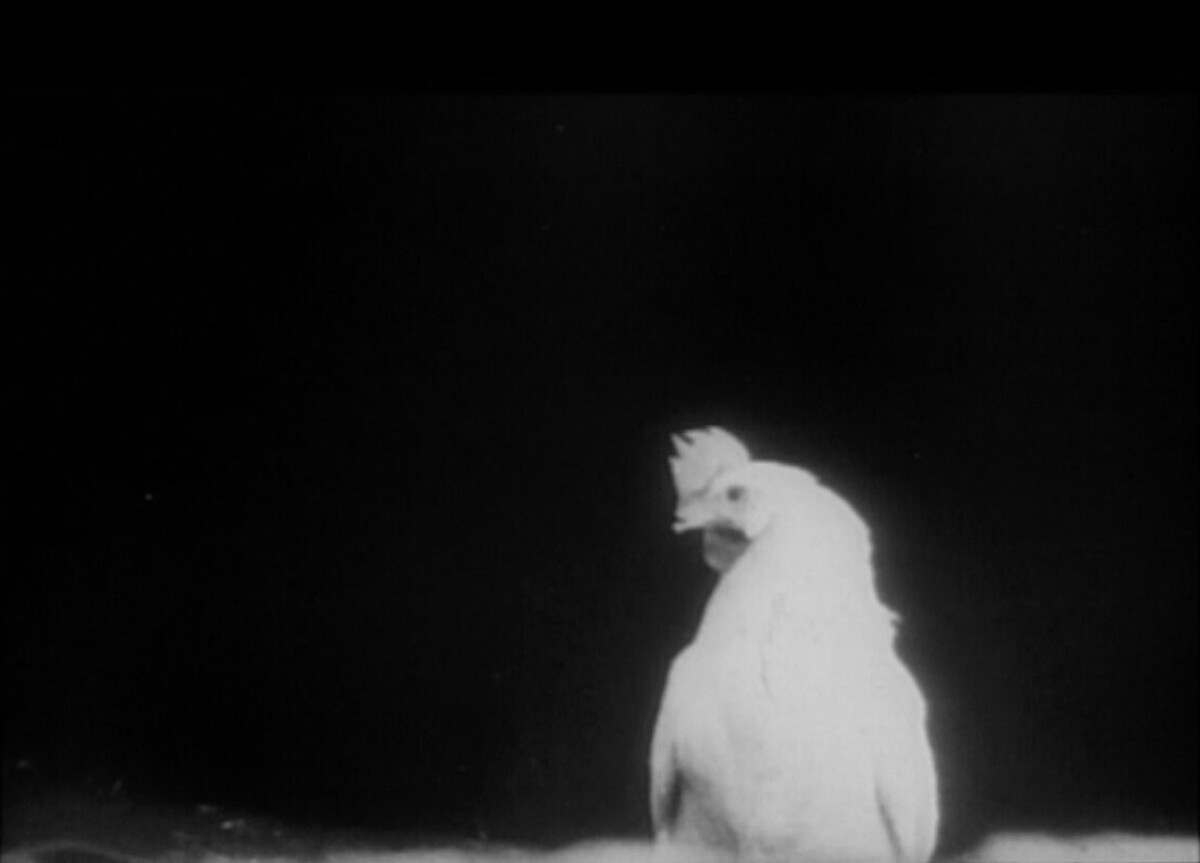Artist Cinemas Presents
Al-Dajaj (The Chickens)
Omar Amiralay
1977
40 Minutes
Arabic with English subtitles
Artist Cinemas
Week #1
Date
August 19–25, 2020
Join us on e-flux Video & Film for the online screening of Omar Amiralay’s Al-Dajaj (The Chickens) (1977), on view from Wednesday, August 19 through Tuesday, August 25, 2020.
The inhabitants of Sadad, a village in the Syrian countryside, are seduced by promises that chicken farming will make them rich. After they abandon their previous activities, their new investment turns to disaster under the watchful gaze of government officials driving Mercedes cars. Under the guise of documenting chicken farms, the late Syrian filmmaker Omar Amiralay delivers a scathing critique of his government. Produced by Syrian national television in 1977, The Chickens remains banned in Syria to this day.
The Chickens is the first instalment of Take Me Back, a program of films, video works, and interviews convened by Jumana Manna, and comprising the third cycle of Artist Cinemas, a long-term, online series of film programs curated by artists for e-flux Video & Film. In lieu of an interview, The Chickens is presented here alongside an excerpt from Manna’s essay “A Small / Big Thing,” previously published in tamawuj.org journal for Sharjah Biennial 13 (2017).
Take Me Back will run for six weeks from August 19 through October 3, 2020, with each film running for one week and featuring an interview with the filmmaker(s) by Manna and other invited guests.
Jumana Manna, excerpt from “A Small / Big Thing”
In the third millennium BC, Ebla was a kingdom spanning all of northern Syria. It functioned as a major trading center in the Fertile Crescent, and it was of equal importance to other nearby civilizations such as the Egyptian and Mesopotamian. In the 1970s, archeologists excavated baked-clay tablets from the area. Their inscriptions enabled a better understanding of the Sumerian language and the political organization of the ancient Levant. The tablets also revealed that no fewer than seventeen varieties of wheat were being cultivated in the surrounding villages, enough to feed eighteen million people. Ebla was situated about fifty-five kilometers southwest of present-day Aleppo, a city that in 2012 became the site of a key battle in the Syrian revolution. That battle came to an end four years later as the result of a suffocating siege inflicted upon rebel forces by the Assad regime, which used brutal methods, including forced starvation.
Some decades earlier, around the same time as archeologists were dusting off the tablets and learning about Ebla’s biodiversity, Hafez al-Assad was modernizing his country’s peasant system, which he considered backwards. He sought to increase production and self-sustainability with a focus on wheat and cotton, placing them under a state monopoly. In the process, the dictator brought rural populations under his control, as entire villages were flooded when dams were built to increase irrigation capabilities, peasants were contracted to farm and given quotas for their yields, and technological innovations replaced traditional agricultural methods.
The late filmmaker Omar Amiralay documented the effects of such modernization in The Chickens, his forty-minute, black-and-white documentary from 1977. Amiralay shot the film in Sadad, a village south of Homs, where rainfall is scarce and agriculture had always been secondary to textile work. Incentivized by the state, villagers cleared out their weaving looms to make room for chicken coops. They financed their investment with money borrowed from better-off neighbors, or small loans from the government. Amiralay’s sensitivity to the plight of farmers is brought forth in brief conversations with them. “I raised chickens because I saw everyone raising chickens,” one farmer tells him, while another explains: “A partner always feels his partner’s hopes and pains,” a claim the filmmaker follows with the sound of clucking chickens, overlaid with mass chanting: “Syria! Syria! Syria!” But Syria’s agrarian sector did not always embody this partnership. With sudden overproduction in the poultry industry and a plague affecting chickens, the farmers who had bet everything on their coops were quickly forced into bankruptcy.
Such policies of economic liberalization introduced a whole new set of struggles for Syria’s farmers, while also bettering their living standards in various respects. [1] This determination to upscale and modernize agriculture while making the previously self-sustaining peasant classes subservient to the regime in power was, in fact, very much in line with the global trend of the time, as I have come to learn. In the mid-twentieth century, a strategy to end hunger in the world through the widespread dissemination of high-yielding seeds, irrigation techniques, and chemicals was launched, and it would quickly become the standard for global agriculture across geopolitical divides. This new standard, coined “The Green Revolution,” expedited the transformation of vast parts of the world from traditional agrarian societies to market-oriented, state-coordinated commodity producers. In the Cold War era, American leaders and philanthropists such as the Rockefellers, the Ford Foundation, and the United States Agency for International Development (USAID) believed that left-leaning sympathies were more likely to spread where there was poverty. Developing a profit-based model for agriculture in the Third World would therefore be an effective antidote to communism. While it did increase yields for some farmers and certain crops, the Green Revolution also pushed millions of agricultural producers into unemployment, and caused unprecedented environmental damage and erosion of biodiversity.
[1] These factors include education, health, transportation, electricity, and the exemption of income tax.
For more information, contact program@e-flux.com.

